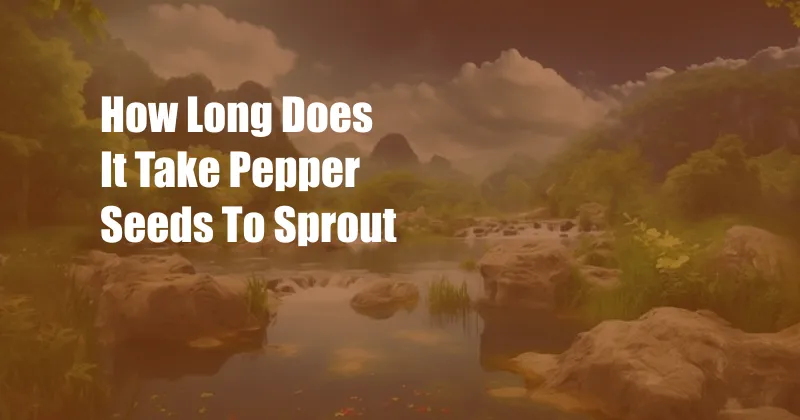
Pepper Seeds: A Comprehensive Guide to Sprouting Time and Growing Success
As a seasoned gardener, I’ve nurtured countless pepper plants from seed to harvest, witnessing firsthand the transformative journey they embark on. In this detailed guide, I’ll share my knowledge and insights on “How Long Does It Take Pepper Seeds to Sprout,” empowering you to succeed in your gardening endeavors. Whether you’re a seasoned gardener or dipping your toes into the world of horticulture, this article will equip you with the knowledge and techniques necessary for successful pepper seed sprouting.
Before we delve into the intricacies of pepper seed germination, let’s explore the captivating history and cultural significance of the pepper plant. Native to Central and South America, peppers have been an integral part of human civilization for centuries. Ancient civilizations, including the Aztecs and Mayans, cultivated peppers for their medicinal and culinary properties, and they were later introduced to Europe and Asia through the voyages of Christopher Columbus.
Understanding Pepper Seeds and Germination
Pepper seeds, like all plant seeds, contain an embryo that holds the genetic blueprint for the future plant. When exposed to favorable conditions, the embryo awakens and begins the process of germination. Germination is a crucial phase in the life cycle of a pepper plant, marking the transition from a dormant seed to an active seedling.
The germination process initiates with imbibition, where the seed absorbs water and swells. This influx of moisture triggers enzymatic reactions that mobilize stored food reserves within the seed, providing energy for embryonic growth. The radicle, the primary root of the plant, emerges first, anchoring the seedling in the soil. Subsequently, the hypocotyl, the stem that connects the root to the cotyledons, elongates, lifting the cotyledons, the first leaves of the seedling, above the soil surface.
Factors Influencing Pepper Seed Sprouting Time
The time it takes for pepper seeds to sprout is influenced by several factors, including:
- Temperature: Pepper seeds germinate optimally in temperatures ranging from 21°C to 29°C (70°F to 85°F). Fluctuations outside this range can slow down or inhibit germination.
- Moisture: The soil or germination medium must be consistently moist but not waterlogged. Excessive moisture can lead to seed rot, while insufficient moisture can prevent germination.
- Light: While pepper seeds can germinate in darkness, light exposure can enhance germination rates and promote healthy seedling growth.
- Seed Quality: Fresh, viable seeds have a higher germination rate than older or damaged seeds. Selecting high-quality seeds from reputable suppliers increases the chances of successful germination.
Optimizing Germination Conditions for Pepper Seeds
To maximize germination, provide pepper seeds with an environment that meets their specific needs. Here’s how:
- Choose the right time of year: Sow pepper seeds indoors 6-8 weeks before the last frost date in your area. This allows ample time for the seedlings to develop strong root systems before being transplanted outdoors.
- Prepare a suitable potting mix: Use a well-draining, seed-starting mix that provides adequate moisture retention. Avoid using garden soil, which can be too dense and retain too much moisture.
- Create a warm and humid environment: Cover the seed tray with a clear plastic lid or place it in a warm, humid location. This helps maintain the optimal temperature and moisture levels for germination.
- Provide light: Expose the seed tray to bright, indirect light for 12-16 hours per day. You can use grow lights or place the tray in a south-facing window.
Tips for Successful Pepper Seed Germination
Beyond the essential conditions, follow these expert tips to further enhance pepper seed germination:
- Use a seed warmer: A seed warmer can provide the consistent temperature required for optimal germination, especially during cooler months.
- Pre-soak the seeds: Soaking pepper seeds in warm water for 24 hours before planting can help soften the seed coat and speed up germination.
- Scarify the seeds: Lightly scratching the surface of the seed coat with a knife or sandpaper can also improve germination rates.
- Don’t overwater: Keep the soil moist but not soggy. Overwatering can lead to seed rot and hinder germination.
- Be patient: Germination can take anywhere from 7 to 21 days, depending on the variety of pepper and the environmental conditions. Don’t give up if you don’t see sprouts immediately.
Frequently Asked Questions about Pepper Seed Sprouting
Q: How deep should I plant pepper seeds?
A: Plant pepper seeds about 1/4 inch deep into the potting mix.
Q: How many pepper seeds should I plant per pot?
A: It’s recommended to plant 2-3 seeds per pot. If multiple seeds germinate, thin the seedlings to the strongest one.
Q: What do I do after pepper seeds germinate?
A: Once the seedlings have developed their first set of true leaves, you can transplant them into individual containers or the garden.
Q: Can I save pepper seeds for future planting?
A: Yes, you can save pepper seeds from healthy, ripe fruits. Extract the seeds, dry them thoroughly, and store them in an airtight container in a cool, dry place.
In Conclusion
Understanding the intricacies of pepper seed sprouting is crucial for successful pepper gardening. By adhering to the principles outlined in this guide, you can increase your chances of cultivating thriving pepper plants that will reward you with a bountiful harvest. Whether you’re an experienced grower or just starting your gardening journey, I encourage you to apply these techniques and discover the joy of nurturing pepper plants from seed to fruit. Share your experiences and questions in the comments below. Happy gardening! Would you like to learn more about pepper seed germination or other aspects of gardening?